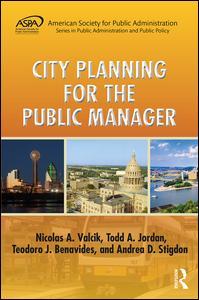Description
City Planning for the Public Manager
ASPA Series in Public Administration and Public Policy Series
Authors: Valcik Nicolas A., Jordan Todd A., Benavides Teodoro J., Stigdon Andrea D.
Language: English
Subject for City Planning for the Public Manager:
Keywords
Organizational Theory Framework; Andrea D; Stigdon; Local Governmental Services; Teodoro J; Benavides; Tahoe Regional Planning Agency; Todd A; Jordan; Qualcomm Stadium; Tax Increment Financing Districts; Public Administration; Capital Improvements Element; City Administrators; Elected Officials; Overlay Districts; Geospatial Information Systems; Economic Development Projects; PIDs; Zoning Ordinance; Environmental Issues; Suburban Business Districts; Comprehensive Master Plan; Los Standard; Federal Aviation Administration; FAA; SCPEA; SZEA; Consensus Building Model; Objective QoL; Enabling Act
101.81 €
In Print (Delivery period: 15 days).
Add to cart· 15.2x22.9 cm · Hardback
Description
/li>Contents
/li>Readership
/li>Biography
/li>
Why should public administrators care about city planning? Is city planning not a field ruled by architects and public works personnel? Much of city planning in fact requires expertise in areas other than buildings and infrastructure, and with city planning expertise, urban administrators are empowered to make more informed decisions on matters that involve budgeting, economic development, tax revenues, public relations, and ordinances and policies that will benefit the community. City Planning for the Public Manager is designed to fill a gap in the urban administration literature, offering students and practitioners hands-on, practical advice from experts with diverse city administration experience, and demonstrating where theory and practice intersect.
Divided into three sections, the book provides an overview of the life cycle of a municipality and its services, explores city planning applications for planners on a strict budget, and walks the reader through a real-life planning research project, demonstrating how it was formulated, implemented, and analyzed to produce usable results. Topics explored include justifications for specific city services, internal and external benchmarking used for city planning, common technical tools (e.g., GIS), legal aspects of planning and zoning, environmental concerns, transportation, residential planning, business district planning, and infrastructure. City Planning for the Public Manager is required reading for students of urban administration and practicing city administrators interested in improving their careers and their communities.
Section 1. The Foundations of City Planning 1. Introduction: The History of Cities in Europe and the United States 2. Overview of City Planning 3. Urban Design Section 2. Considerations with City Planning 4. Prioritizing City Services 5. Internal and External Benchmarking 6. Tight Budgets and Justifications 7. Legal Aspects of Planning and Zoning 8. Common Technical Tools for City Planning Section 3. Technical Information for City Planning 9. Environmental Concerns for Planning 10. Transportation and Infrastructure Planning 11. Housing and Neighborhood Integrity Section 4. The Economics of City Planning 12. Central and Suburban Business District Planning 13. Planning in Support of Economic Development 14. Comprehensive Master Plan and Putting it all Together Section 5. Conclusion 15. Conclusions: Decision-Making and Political Realities of City Planning
Nicolas A. Valcik works as the Director for Institutional Research for West Virginia University, USA.
Todd A. Jordan serves as the Director of Community Impact at United Way of Wyandotte County, Kansas, USA.
Teodoro J. Benavides serves as a faculty member of Public Affairs in the School of Economic, Political, and Policy Sciences at the University of Texas at Dallas, USA.
Andrea D. Stigdon works in the Office of Strategic Planning and Analysis at The University of Texas at Dallas, USA.




